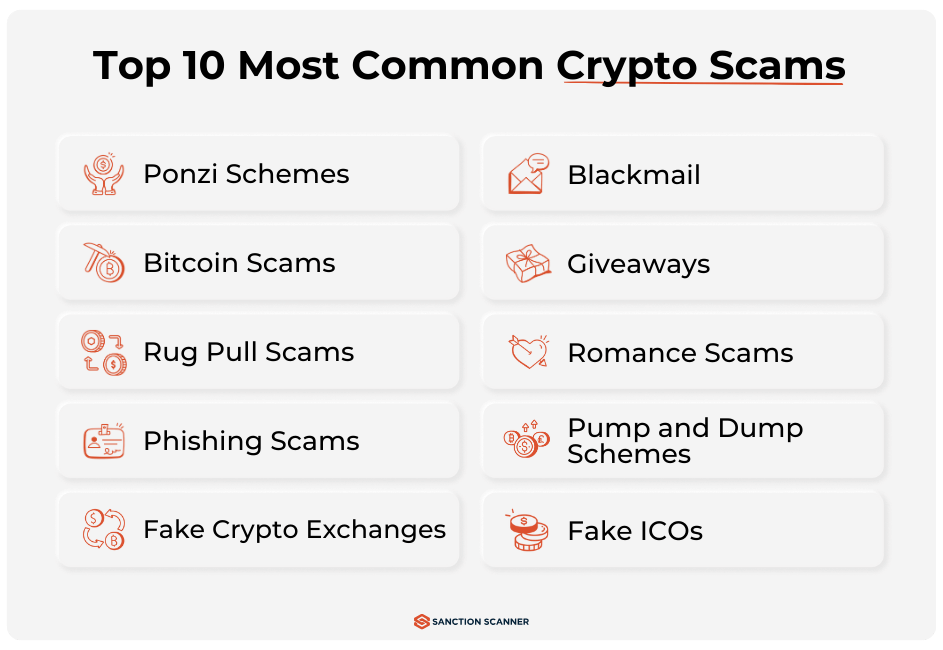Cryptocurrency has transformed the financial landscape, attracting millions of investors worldwide. However, as digital currencies grow in popularity, so do the risks associated with them. In fact, crypto-related scams led to losses exceeding $3.9 billion in 2022 alone, a stark reminder that the digital gold rush has its pitfalls. From elaborate phishing schemes to fake exchanges, these scams prey on both beginners and seasoned investors alike.
What Are Crypto Scams?
Crypto scams are fraudulent schemes designed to deceive individuals into giving away their cryptocurrency or personal information, often under the guise of legitimate investment opportunities, exchanges, or services. These scams exploit the decentralized and relatively new nature of the cryptocurrency market, making it easier for criminals to operate with anonymity and target unsuspecting victims. Common forms of crypto scams include phishing attacks, fake exchanges, Ponzi schemes, and rug pulls, all of which can result in significant financial losses for those who fall victim.
Common Types of Crypto Scams

There are numerous types of crypto scams. Among the most common are:
1. Ponzi Schemes: The Danger of ‘Guaranteed Returns’
Ponzi schemes are a classic form of financial fraud that has made its way into the cryptocurrency world, preying on investors with promises of guaranteed returns. In these schemes, early investors are paid returns from the funds of newer investors, creating the illusion of a profitable investment. However, once the influx of new investors slows down, the scheme collapses, leaving the majority of participants with significant losses.
What are Signs of a Ponzi Scheme in Crypto?
- Guaranteed High Returns: Be cautious of any investment that promises consistent, high returns with little or no risk. Legitimate investments will always have some level of risk.
- Complex or Vague Investment Strategies: Ponzi schemes often use complicated or unclear explanations to mask the fact that they are not actually generating returns through legitimate means.
- Pressure to Recruit New Investors: If an investment opportunity emphasizes recruiting new participants, it may be a sign that the scheme relies on new funds to pay returns to earlier investors.
2. Bitcoin Scams: Navigating the Risks in the Cryptocurrency World
Bitcoin scams are fraudulent schemes specifically targeting investors in Bitcoin, leveraging its popularity and value to deceive individuals into losing their funds.
To get started, the scammers want a charge. The crooks then simply steal the upfront payments instead of making money. Scammers may also ask for personal identity information under the guise of transferring or depositing payments and gaining access to a person's cryptocurrency. Another sort of crypto scam is the use of phony celebrity endorsements. Scammers utilize real photographs and post them in false accounts, advertising, or articles to make it appear as if the celebrity is promoting a substantial cash return on investment. The sources supporting these assertions appear to be authentic, as they use respected brand names like ABC or CBS, as well as professional-looking websites and logos. The endorsement, however, is a forgery.
How to Protect Yourself from Bitcoin Scams:
- Verify Platforms and Offers: Always research and verify the legitimacy of any investment platform or offer before committing your funds. Look for reviews, regulatory compliance, and transparency in operations.
- Guard Your Private Keys: Never share your private keys or login details. Be cautious of unsolicited communications asking for sensitive information.
3. Rug Pull Scams: When Developers Abandon Ship
Rug pulls have become a notorious scam in the decentralized finance (DeFi) space, where developers create seemingly legitimate crypto projects only to abandon them after attracting significant investment. This scam typically involves developers draining liquidity from the project’s funds, leaving investors with worthless tokens as the project crashes. Scammers steal money and then vanish with it. Because the code for these investments prevents customers from selling Bitcoin after they purchase it, they are left with a useless investment.
One of the most infamous rug pulls occurred in 2021 with the Squid Game token. The token gained massive popularity, riding the wave of the hit Netflix series, but it turned out to be a scam. After the price skyrocketed, the developers suddenly withdrew all liquidity from the project, disappearing with an estimated $3.38 million and leaving investors with tokens they couldn’t sell.
How to Avoid Rug Pulls?
- Examine the Team: Investigate the developers behind the project. Are they anonymous, or do they have a verified track record in the crypto industry?
- Analyze Liquidity and Locks: Check if the liquidity is locked and for how long. Locked liquidity means the developers cannot easily withdraw funds.
- Review the Project’s Code: If possible, examine the project’s smart contract code or consult with experts. Transparent projects often have their code audited by third parties.
4. Phishing Scams: How Hackers Steal Your Crypto
Phishing scams are one of the most dangerous threats in the cryptocurrency world, targeting both new and experienced investors. Crypto phishing scams have been around for a while and are still prevalent. These scams involve cybercriminals impersonating legitimate companies, exchanges, or wallets to trick users into revealing sensitive information like private keys or login credentials. Once these details are compromised, hackers can quickly drain cryptocurrency from the victim’s account.
A notable real-world case occurred in 2020 when phishing emails masquerading as Ledger, a popular hardware wallet provider, tricked thousands of users. The emails directed them to a fake website that mimicked the official Ledger site, where they were asked to input their recovery phrases. As a result, victims lost millions in cryptocurrency.
How to Avoid Phishing Scams?
- Verify URLs: Always double-check the URL before entering any sensitive information. Phishing sites often have slight misspellings or unusual domain names.
- Avoid Unsolicited Links: Be cautious of unsolicited emails, texts, or social media messages asking for your personal information or urging you to click on a link.
- Use Two-Factor Authentication (2FA): Enable 2FA on your crypto accounts to add an extra layer of security.
5. Fake Crypto Exchanges: The Trap of Unrealistic Offers
Fake cryptocurrency exchanges are a prevalent scam that lures investors with the promise of unbeatable rates, low fees, or exclusive access to new coins. Scammers may tempt investors by promising spectacular crypto and possibly even some more Bitcoin. However, there is no exchange, and the investor is unaware that they have been duped until they lose their deposit. These fraudulent platforms are designed to look like legitimate exchanges, but once users deposit their funds, they quickly discover that they can’t withdraw them—or the exchange simply disappears overnight.
How to Spot a Fake Crypto Exchange?
- Check for Licensing and Regulation: Legitimate exchanges are typically registered with regulatory bodies. Always verify the exchange’s licensing information.
- Research User Reviews: Look for independent reviews and feedback from other users. If an exchange has numerous complaints about withdrawal issues or poor customer support, consider it a red flag.
- Be Wary of Unrealistic Offers: If an exchange is offering deals that seem too good to be true, they probably are. Scammers often use attractive offers to lure in victims quickly.
6. Fake Initial Coin Offerings (ICOs)
Fake Initial Coin Offerings (ICOs) exploit the excitement and potential of new cryptocurrencies to defraud investors. During the ICO boom, which peaked around 2017, many new projects raised substantial amounts of money through ICOs—public fundraising events where investors could purchase tokens before they were listed on exchanges. While some ICOs led to successful and legitimate ventures, many were nothing more than elaborate scams designed to take advantage of the hype surrounding digital currencies.
How to Identify a Fake ICO?
- Lack of Transparency: Genuine ICOs provide detailed information about the team, technology, and business plan. If an ICO lacks transparency or offers vague details, it could be a scam.
- Unrealistic Promises: Be wary of ICOs that promise guaranteed returns or extraordinarily high profits. Legitimate projects will emphasize potential risks alongside rewards.
- No Audit or Code Review: Trustworthy ICOs usually undergo third-party audits and have their code reviewed by experts. The absence of such reviews is a red flag.
7. Pump and Dump Schemes: The Manipulation of Crypto Prices
Pump and dump schemes are a type of market manipulation where scammers artificially inflate the price of a cryptocurrency to attract unsuspecting investors, only to sell off their own holdings at the inflated price, causing the value to plummet and leaving other investors with significant losses. These schemes often involve coordinated efforts to drive up the price through misleading promotions, social media hype, and fake news.
How to Recognize and Avoid Pump and Dump Schemes?
- Beware of Sudden Price Surges: If a cryptocurrency experiences an unexplained and rapid increase in price, investigate the cause before making any investment. Such surges can be orchestrated as part of a pump-and-dump scheme.
- Scrutinize Market Activity: Look for signs of coordinated buying and selling activities or unusually high trading volumes. Scammers often use these tactics to manipulate prices.
- Check for Unverified Endorsements: Be cautious of investments promoted by social media influencers or through unverifiable endorsements. Scammers often use these methods to create artificial hype.
8. Romance Scams: The Emotional Trap of Crypto Scam
Romance scams are a deceptive scheme where scammers build emotional relationships with victims, often through online dating platforms, to gain their trust and eventually exploit them financially. In the context of cryptocurrency, these scams involve convincing victims to invest in cryptocurrencies or transfer funds under the guise of a romantic partner's urgent financial needs.
How to Protect Yourself from Romance Scams:
- Verify the Identity: Be cautious if your online romance partner starts discussing financial matters or asks for money. Verify their identity through multiple channels and be wary of requests for funds.
- Watch for Red Flags: Emotional manipulation tactics, urgent requests for money, and inconsistent stories about financial needs can be signs of a romance scam.
- Be Skeptical of Investment Offers: If your partner is promoting cryptocurrency investments or other financial opportunities, approach these offers with skepticism.
9. Giveaways: The Allure of Free Crypto and the Scams Behind It
Giveaways are a popular promotional tactic in the cryptocurrency world, often used to attract new users or create buzz around a new project. However, scammers have exploited the appeal of free crypto to lure unsuspecting individuals into fraudulent schemes. These scams usually involve fake giveaways that promise substantial rewards in exchange for personal information or a small initial investment, only to disappear once they have collected the necessary data or funds.
Common Giveaway Scams
- Fake Celebrity Endorsements: Scammers often use the names and images of celebrities or prominent figures in the crypto space to lend credibility to their giveaway promotions.
- Unrealistic Promises: Be wary of giveaways that promise excessively large amounts of cryptocurrency or ask for payment or personal details in exchange for a free reward.
- Unverified Sources: Always verify the legitimacy of any giveaway through official channels. Scammers may create fake websites or social media accounts to promote their fraudulent offers.
10. Blackmail: The Threat of Financial Extortion in Crypto
Blackmail is a sinister scam where criminals use threats to coerce victims into transferring cryptocurrency or divulging sensitive information. In the crypto space, blackmail is often scammed by scammers obtaining compromising information or images and threatening to expose them unless the victim pays a ransom in Bitcoin or another digital currency.
Common Blackmail Tactics
- Compromising Information: Scammers may claim to have obtained private or sensitive information from the victim, often through hacking or social engineering.
- Threats of Exposure: The threat of publicly revealing embarrassing or damaging information is used to coerce the victim into paying a ransom in cryptocurrency.
- Extortion for Crypto: The scammers demand payment in Bitcoin or other cryptocurrencies, exploiting the difficulty in tracing these transactions to pressure victims into compliance.
How to Detect Crypto Scams?
Detecting crypto scams requires awareness and diligence. Here are essential strategies to help you spot and avoid fraud:
- Educate Yourself: Learn about blockchain technology and cryptocurrencies.
- Use Established Exchanges: Choose well-known and trusted cryptocurrency exchanges. Lesser-known platforms often pose higher risks.
- Be Skeptical of Unrealistic Promises: Be cautious of any investment offering guaranteed returns or “risk-free” promises, as these are often scams.
- Check Scammer Lists: Use crypto scam lists or trackers to check if a platform or project has a history of fraud.
- Verify Information: Investigate a project's documentation, team, and community reviews to confirm its legitimacy.
- Enable Multi-Factor Authentication (MFA): Use MFA on your accounts and wallets to add an extra layer of protection.
- Use a Secure VPN: Employ a VPN to secure your online activities and protect against cyber threats.
- Keep Software Updated: Regularly update your software and security tools to prevent vulnerabilities.
- Double-Check URLs: Ensure website URLs are correct and include “https” to avoid phishing sites.
- Keep Private Keys Secure: Store your private keys offline and use hardware wallets for added security.
How Crypto Companies Can Safeguard Against Crypto Scams?
To effectively combat scams and enhance platform security, crypto companies should implement the following strategies:
- Layered Defense: Use a combination of security measures such as firewalls, DDoS protection, and intrusion detection systems to create a robust defense against various cyber threats.
- Identity Verification: Apply stringent Know Your Customer (KYC) processes to verify user identities and prevent fraudulent activities.
- Anti-Money Laundering Measures: Implement Anti-Money Laundering (AML) practices to monitor transactions and identify suspicious behavior, reducing the risk of illegal activities.
- Ongoing Surveillance: Keep a close eye on user activities and update your systems regularly to address any vulnerabilities.
- User Awareness: Provide resources and guidance on security best practices to help users recognize and avoid scams.
- Data Protection: Regularly back up critical data and apply encryption to both stored and transmitted data. This protects against data breaches and loss.
- Comprehensive Training: Educate all staff members, including non-technical personnel, about current security threats and best practices. Awareness at all levels can prevent human error and enhance overall security.
- Information Sharing: Collaborate with other cryptocurrency platforms to exchange information about potential threats and fraudulent actors. Joint efforts can strengthen collective defenses and improve overall security.
Discover Our Advanced Fraud Detection Solutions
At Sanction Scanner, we are committed to empowering crypto companies with cutting-edge fraud detection solutions. Our advanced fraud detection system leverages real-time data analysis and machine learning to identify and prevent suspicious activities, ensuring a secure trading environment. With customizable alerts and comprehensive monitoring, our tools are designed to stay one step ahead of emerging threats. To see how our solutions can protect your platform from fraud, we invite you to request a demo. Experience firsthand how Sanction Scanner can enhance your security and operational efficiency.









